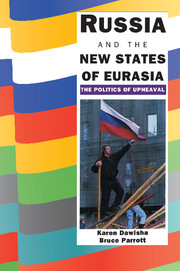Book contents
- Frontmatter
- Contents
- Preface
- Maps
- Introduction
- 1 The Legacies of History
- 2 National Identity and Ethnicity
- 3 The Impact of Religion
- 4 Political Culture and Civil Society
- 5 The Impact of Economics
- 6 Foreign Policy Priorities and Institutions
- 7 Military Issues
- 8 The Nuclear Factor
- Conclusion
- Appendix A Chronology of Events, January 1992 to October 1993
- Appendix B Compendium of Leadership and Institutional Changes in the Eurasian States, January 1992 to October 1993
- Appendix C Soviet Census Data, Union Republic and ASSR, 1989
- Notes
- Index
3 - The Impact of Religion
Published online by Cambridge University Press: 06 July 2010
- Frontmatter
- Contents
- Preface
- Maps
- Introduction
- 1 The Legacies of History
- 2 National Identity and Ethnicity
- 3 The Impact of Religion
- 4 Political Culture and Civil Society
- 5 The Impact of Economics
- 6 Foreign Policy Priorities and Institutions
- 7 Military Issues
- 8 The Nuclear Factor
- Conclusion
- Appendix A Chronology of Events, January 1992 to October 1993
- Appendix B Compendium of Leadership and Institutional Changes in the Eurasian States, January 1992 to October 1993
- Appendix C Soviet Census Data, Union Republic and ASSR, 1989
- Notes
- Index
Summary
Like nationalism, religion can serve as a key component of political identity. Some pioneers in the study of modern nationalism have suggested that nationalism's emergence has coincided with a decline in religiosity, and it probably is true that changes in the psychological role of religion were a precondition for the development of national identities among the adherents of universal religions. However, religion and nationalism do not necessarily occupy the same psychological space in people's minds, and the two phenomena are not mutually exclusive. Although some brands of nationalism have been strictly secular, some of the twentieth century's most passionate nationalists have been religious believers. As a rule, concrete circumstances determine whether religion becomes a salient element of political identity and whether it reinforces or undermines a sense of cohesion within a particular national group.
At least six variables affect the political impact of a given religious confession. One is whether the confession is national or supranational in scope, and therefore how readily it can become a vehicle of national consciousness and political mobilization. A second variable is the institutional structure of the religion, which affects both its capacity to mobilize believers and its susceptibility to state control. A third is the number of adherents of the confession relative to the size of the society as a whole. A fourth is the spiritual content of the particular confession, especially its attitude toward the legitimacy of secular political authority and its tradition of independence or subservience to the state. A fifth variable is whether the confession's religious leaders seek to steer it toward or away from active involvement in worldly affairs.
- Type
- Chapter
- Information
- Russia and the New States of EurasiaThe Politics of Upheaval, pp. 90 - 122Publisher: Cambridge University PressPrint publication year: 1994



